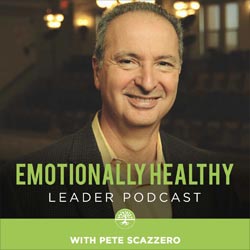


👉 Take the free EHD Maturity Assessment: emotionallyhealthy.org/mature
—-------------------------------
Most pastors and leaders are trained to preach, strategize, and serve—but few are ever taught how to lead from a deeply anchored, differentiated self. And yet, this is the foundation for every healthy team and ministry.
In today’s episode, I unpack one of the most overlooked killers of team health and mission: low differentiation. Drawing from Family Systems Theory, the leadership of David and Jesus, and my own hard-earned lessons over decades, I’ll share four critical reasons why low differentiation sabotages your team—and what you can do about it.
When leaders overfunction, avoid hard conversations, or build their identity on others’ approval, it fractures their soul and destabilizes the team. But when you lead from a solid self—rooted in God, not the demands around you—you raise the maturity level of everyone around you.
This is the crucible of spiritual leadership: becoming yourself in Christ, for the sake of others.
Listen in. It may change how you lead forever.

When we step back to see the global, cross-racial, international, historical church as God sees, it is powerfully transformative. In part 3 of this podcast series, Pete expounds on why it is so essential to learn from Christians different than us, as well as from history if we are going to make serious disciples of Jesus. After giving a brief overview of church history, he shares ten treasures for mission from Scott Sunquist, President at Gordon-Conwell Theological Seminary.

Where did we get the idea that it’s possible to be spiritually mature while remaining emotionally immature? In this podcast Pete explores the gaps in our theology that have caused such a tragic state of affairs in the church and outlines the core components of integrating emotional health into our discipleship and leadership development.

What are the leadership blind spots that prevent us from developing mature, deeply changed disciples and leaders? Pete addresses the first blind spot, exploring the sobering truth that leadership is essentially giving away who you are, that we can only truly give away what we are living. When we skim in our relationship with God, no spiritual program can substitute for the superficiality and striving that inevitably follows.

Pete builds on last week’s message, “Listen,” and moves to practical applications that have served him to sharpen his own discernment process. In particular, he draws from the insights of Ignatius of Loyola, the founder of Jesuits and shares four insights that have served him in listening and discerning God’s will.

Listening and discerning what God is saying is one of the most important areas of discipleship for any Christian. This especially applies to leaders. When we listen wrongly, the ripple effect is far-reaching. In Matthew 17, we observe Peter in a hurry to advise Jesus. He attempts to do the right thing for Jesus, but instead of waiting and listening, he is too eager to make plans. God the Father rebukes him and calls him to right listening, a listening that allows the word of Jesus to do its full work and create a relaxed, un-frenetic obedience in and through him.

In this podcast, Pete shares 6 unique contributions Emotionally Healthy Discipleship brings to the challenge of bridging barriers of race, culture and class and shares the final four contributions of EH Discipleship to this pressing global issue that confronts us as the church in the 21st century.

The first Christians viewed themselves as part of world-wide family that transcended national, class, cultural, and racial barriers. They understood Jesus, through his blood shed on the cross, had destroyed these barriers and created new people, the church (Eph. 2:14-15). Pete shares his story in coming to grips with this complex reality as a new believer and how it led him to plant New Life Fellowship Church in New York City with a mission to bridge racial, cultural, economic and gender barriers. He also discusses three contributions of EH Discipleship for building reconciled communities.

It has been said that all of life is one person handing off their anxiety to another. There are few places this applies more clearly than in leadership. In chapters 6 & 7 of the gospel of John, Jesus' brothers come to Him frantic with worry that Jesus’ ministry is in deep trouble and urge him to go to Jerusalem so the crowds can see his miracles and he can rebuild his following. Jesus refuses to take on their leadership anxiety, replying: “My time has not yet come; for you any time will do” (John 7:1-9). How did Jesus so calmly deal with their anxiety? What do you normally do when external counsel, or an internal voice, urge you to act quickly so you don’t appear to be failing?

Pete and his wife Geri sit down to reflect on the 7 Marks of an Emotionally Healthy Wedding. On August 17th of this year, Pete and Geri hosted an international wedding with 20-25 guests coming from the other side of the world. As a result, a one-day wedding grew into a larger five-day event and offered a window into a unique, high-level application of Emotionally Healthy Discipleship.

Each of us encounters storms and circumstances we cannot overcome. In this podcast, Pete talks about moving beyond an intellectual belief in the resurrection of Jesus to a practical trust that transforms our obstacles into gifts. In John 11 Jesus asks Mary a question: Did I not tell you that if you trust, you will see the glory of God? (John 11:40). He asks us the same question today.





